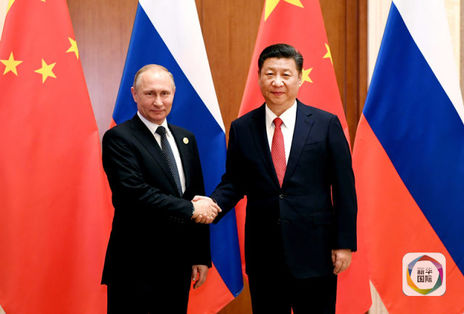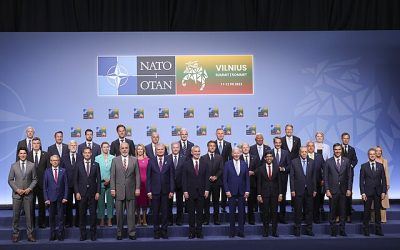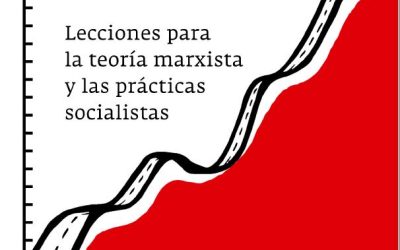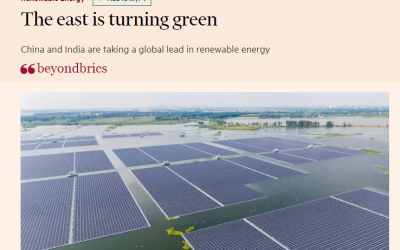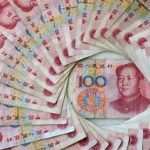To grasp this it is necessary to grasp clearly why the main threat to world peace today comes from the danger of military adventurism from the United States. This is factually obvious from the long series of recent wars by the US – the invasion of Iraq, the attack on Serbia, the war in Afghanistan, the bombing of Libya, numerous smaller conflicts – but it also flows from much deeper structural causes.
The weakening global position of the US economy
The US economy is losing its global hegemony. In the immediate aftermath of World War II, in a world shattered by military conflict, the US possessed overwhelming economic power. In 1960, at current exchange rates, the US still accounted for 40% of world GDP. But by 2016 the US was only 25% of world GDP – that is, the rest of the world accounted for three quarters of global GDP.
At comparable international prices, that is purchasing power parities (PPPs), the situation is even worse. In 2016 the US was only 16% of world GDP and in five years’ time, by IMF calculations, this will have declined to 14%. China’s economy is already larger than the US measured in PPPs – and, as Western analysts confirm, given the current growth rates of the two economies it is only a matter of time before it becomes bigger measured at current exchange rates. Even the IMF, which the factual record shows has made over optimistic predictions of the US growth, calculates that not only China but India will account for a larger share than the US of the increase in world GDP in the next five years.
The rate of growth of the US economy has been slowing for 50 years, and for the last 20 years the annual average rate of growth of US per capita GDP has been only 1.3%.
US military power and the threat of war
Only in one field, the military one, does the US continue to enjoy overwhelming global dominance. The US spends more on its military than the next eight countries in the world combined. But with each year that goes on China’s defence capacity increases. While it will be a prolonged period before China matches the accumulated global military strength of the US it will be a much shorter period before China acquires military dominance in the area surrounding its own borders – as US military analysts conclude.
In this situation, a historical analogy can clarify the issues at stake. In 1912, that is two years before World War I, the German Chief of Staff von Moltke’s made a notorious assessment that ‘war is unavoidable and the sooner the better’. This was explained by him in terms of the military strengthening of Russia compared to Germany, the rising power of the US, and that the German army was beginning to become financially constrained. German ruling circles felt their position had passed the apogee of their power and Germany was now weakening. Therefore, von Moltke’s assessment that the sooner war came the better was not empty words but a cold-blooded assessment. And of course in 1914 war was launched – even if it did not have the outcome German ruling circles had hoped for.
Of course, the invention of nuclear weapons alters the situation compared to von Moltke’s day. The US, for example, never dared launch direct war with the USSR because the nuclear weapons possessed by the Soviet Union would have devastated the United States. Only indirect ‘proxy’ wars were waged by the US against the USSR – for example in Vietnam. Only if the US could have perfected the ‘Star Wars’ missile defence system could it have considered as a practical option direct war with the USSR – and it is precisely for that reason that Reagan put such large resources into ‘Star Wars’. Today, with more advanced technology and more reliable systems, the US is a bit closer to being able to block at least a limited missile attack on the US. And deployment of anti-missile systems such as THAAD in South Korea are, naturally, not only or even primarily aimed against North Korea but against China and Russia – as China and Russia have rightly stated. President X Jinping clearly stated: ‘The deployment of the “THAAD” anti-missile system by the United States seriously damaged the strategic interests of China and Russia, including the strategic interests of China and Russia…The two sides [China and Russia] will individually and together take the necessary measures to safeguard the security interests of the two countries.’
China today does possess sufficient nuclear capacity that it could inflict unacceptable damage on the US. For that reason, not even the most extreme neo-con circles in the US proposes direct war with China – although they do propose economic attacks on China or intervention to block China’s interests in other countries or continents such as Africa. Today the main tactic of the US against China is to attempt to slow China’s economy – as analysed in my book The Great Chess Game? (Yi pan da qi) . But the US continues to put its resources into missile defence systems, such as THAAD in South Korea, and into developing more advanced anti-missile technology, in the hope of acquiring the capability to have a reliable defence against China.
Today, and in the next period, only one country possesses the military capacity to completely devastate the United States – that is Russia. Russia possesses not hundreds of nuclear weapons, as does China, but 7,000. Not even the most optimistic US neo-con believes an anti-missile system can be created in the next years capable of blocking Russia’s nuclear weapons from devastating the US if the US ever chose war with Russia.
As long as China and Russia remain on very good terms therefore the US dare not militarily attack China, even if the US makes progress in missile defence, for fear that Russia would also join in the conflict. Under such conditions the dangers of military adventures launched by the US to attempt to avert the consequences of its international economic decline are very greatly weakened. If, however, China and Russia had bad relations the threat of military adventures by the US would be considerably increased. It is for that reason that good relations between China and Russia is the best guarantee of world peace.
Other benefits of good China-Russia relations
While the overwhelming issue for good China-Russia relations remains the strategic one of nuclear arms China also derives other great benefits from good relations with Russia. The aim of the US neo-cons is to encircle China. They have a firm base to do that from to the east of China in Japan. The US also makes efforts, despite its lack of success so far, to draw India into a firm ‘anti-China’ alliance to the south of China. But China’s good relations with Russia protect the whole of China’s northern border. Russia is also an important partner for One Belt One Road.
Russia equally has very strong non-nuclear armed forces. While the US neo-cons do not at present dare to propose a direct military confrontation with China they are not necessarily again local proxy military actions against China, or sending indirect warnings to China – as with the bombing of the Chinese embassy in Serbia. But the combination of Chinese and Russian non-nuclear forces would be extremely strong in the case of any local conflicts. China and Russia can coordinate their actions via the Shanghai Cooperation Organisation (SCO) and other organisations.
Win-win relations
But of course any good relations must be win-win – that is Russia as well as China must also gain from good China-Russia relations. And it is clear Russia does.
Russia was greatly economically weakened by the disastrous consequences of shock therapy and geopolitically by the breakup of the USSR. But for fundamental geopolitical reasons attempts continue to be made by significant forces in Europe, and dominant forces in the US, to attempt to weaken Russia further and even to reverse any recovery that took place in the period 1998-2014. Such attempt are are indeed inevitable in the present global geopolitical situation.
Germany and France dominate the EU and consider it their economic area of political influence. For this reason they wish to exclude or severely limit Russia’s full participation in ‘Europe’. The reason for this is that Russia’s full participation in Europe would make it impossible for Germany and France to fully control ‘Europe’ – Russia would be geopolitically more powerful than either country. Germany and France therefore, at best, are willing to treat Russia as a significant European power, with which agreements can be made, but which will be excluded from the actual structure of the EU, that is Germany and France’s framework of ‘Europe’.
The attitude of dominant circles in the US is far more actively hostile to Russia and actively wishes to exclude it from any major role in Europe. The reason for this is that the EU plus Russia is comparable economically and militarily to the US. Therefore, the dominant circles in the US seek to create bad relations between the EU and Russia. This is why deliberately provocative policies are taken by the US against Russia in the Ukraine and elsewhere. Far from negligible groups among US neo-cons envisage the ultimate goal as to bring about the split up of the Russian Federation. This geopolitical situation explains such US policies as the continual attempts by the US to take NATO closer and closer to Russia’s borders over as wide an area as possible.
Of course, the real interests of the people of Western Europe lie in good relations with Russia, which would eliminate any military tensions in Europe and substantially strengthen economically both Western Europe and Russia. But for reasons already analysed powerfu
l groups in Europe, and the dominant groups in the US, are opposed to such fruitful West European-Russian economic relations.
It is clear that in this geopolitical situation Russia derives considerable benefits from good relations with China. Such good relations increase the overall weight of Russian internationally. Russia’s good relations with China means Russia faces no threat from most of its southern and east and eastern borders which is even remotely comparable to the situation to its west. The Shanghai Cooperation Organisation is a stable and significant organisation, and Russia-China military cooperation is harmonious and growing.
While Russia’s economy was greatly weakened by ‘shock therapy’ China’s economy is strong. China possesses extremely deep resources in terms of finance and also China provides an increasingly important market for Russia’s exports. The Russian concept of the ‘Eurasian Union’ largely overlaps with China’s project of ‘One Belt One Road’.
Geopolitical risks
This advantage of good mutual relations between China and Russia however does not mean that there are no risks or problems.
First in Russia there exists powerful comprador capital groups – the class which robbed the country under shock therapy. Their proposal to the US is simple: drop economic sanctions against Russia over Ukraine and Russia will adopt an anti-China foreign policy. These groups work with neo-con circles, such as Trump’s Chief Strategist Steve Bannon, who see China as the US’s most important rival and who therefore want good US relations with Russia – in order to persuade Russia to adopt an anti-China policy. Such comprador Russian groups are of course not concerned that if the US successfully weakened China the US would then turn around and weaken Russia further, for the simple reason that such Russian comprador groups became rich by chaos within and the weakening of Russia.
Second a serious problem is that Russia’s economy was greatly weakened by shock therapy, creating difficulties in developing an extremely thriving two-way trade between Russia and China.
Agents of the US intelligence services also deliberately try to create bad relations between Russia and China by presenting themselves as ‘ultra-nationalists’ and ‘ultra-patriots’. In Russia they claim China wishes to send tens of millions of people into Siberia to take over large parts of Russian territory – despite the fact that Russia and China has mutually settled and recognised every metre of their border. As President Xi Jinping stated: ‘”The two sides completely solved the historical boundary problem, and more than 4,300 kilometers of common border have become a link between the friendship of the two peoples. ” In China such agents of the US emphasise Russia in the 19th century acquired parts of China’s territory to say China should be on bad relations with Russia now – the real aim of these ‘ultra-Chinese nationalists’ controlled by foreign security forces being to isolate China and to weaken it confronted with the US. These groups seek to threaten the solution which has been fully achieved of all border issues.
The Chinese leadership is of course aware of such threats, which is undoubtedly one of the reasons its pays great attention to relations with Russia. This is why Xi Jinping has met so regularly with President Putin.
These good relations of China and Russia are also strongly in the interests of the people of other countries. The military forces of China and Russia combined are so strong that it makes it very unlikely that even US neo-cons would risk a war – but if China and Russia had bad relations the risk of war would rise for the reasons analysed above. As the effects of a major war would inevitably affect other countries therefore these other countries have a direct interest in peace and therefore in good China-Russia relations.
Harmony not similarity
There is no need to ‘romanticise’ the China-Russia relation. China and Russia are both great civilizations but they are different. Russia may be geographically mostly in Asia but in civilization it is necessarily a European country – because it is Christian, and Christianity is the historical civilization of Europe. China and Russia have a great deal to learn from studying each other’s great contributions to civilization – but they will always remain very different countries. What is useful in the relation is the ancient Chinese concept of ‘harmony’ – which involves the idea of difference without conflict but not of uniformity.
China will never be Russia, and Russia will never be China. But the two countries both have a very great deal to gain from good relations with each other, and would face greatly increased dangers if they were on bad relations. As the good relations of China and Russia is the most important force for world peace, against the threat of any military adventures by a US neo con von Moltke, the whole of the rest of the world has a great interest in the good relations between China and Russia.
Xi Jinping stated in his interview with Russian media accompanying his visit that: ‘China and Russia are the most reliable strategic partners. And ‘At present, the China-Russia comprehensive strategic partnership is in the best period of history’. For that reason, and those analysed in this article, it is greatly to be hoped that President Xi Jinping’s visit to Moscow is as successful as many of his other meeting with Russia and President Putin. These good relations of China and Russia are the most important guarantee of global peace today.
The Chinese language version of this article appeared at Guancha.cn.


